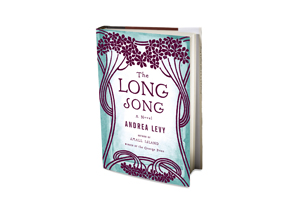Reading Questions for The Long Song
Warning: May contain spoilers

Photo: Jeffrey Westbrook/Studio D
1. When a young woman asked the author how one could possibly take any pride in one's ancestry when all one's ancestors were slaves, she planted the seed that would eventually become The Long Song. By telling such a story and writing this novel, Andrea Levy wanted to make her questioner feel proud of her heritage. Discuss how the novel does this.
2. In Small Island, Andrea Levy told the story of Jamaicans in London just after World War II; in the The Long Song, she goes further back, to the nineteenth century. Both books explore the relationship among the Caribbean, Jamaica, and Britain. What did you learn from The Long Song that surprised you and that you didn't know before? How do you think novels bring the past to life in a way that history books don't?
3. When she was doing research for the novel, Andrea Levy found plenty of accounts of slavery in Jamaica by white plantation owners, but the voices of the plantations' slaves seemed silent or lost. In The Long Song she saw a way to fill the silence with a fictional voice, and to give us a sense of life as it was lived on a daily basis during the period. How successful is the novel in achieving both these aims?
4. July is clearly an unreliable narrator, but what does that mean? How did your feelings for her develop or change in the course of the novel?
5. Caroline Mortimer takes July away from her mother without any thought. Discuss how the relationship between master and servant develops. Does it change once July is "free"?
6. Discuss the author's use of language and of voice in the novel. How does she use humor in tackling the grim and disturbing subject of slavery?
7. Discuss the differences between men's power and women's power in The Long Song. Who are the most vulnerable characters?
8. What role does religion play in the novel? What motivates the leaders of the Baptist revolution, some of whom are tortured for their abolitionist beliefs? What does Christianity mean to the characters?
9. What does Robert Goodwin learn about the nature of work and worth? How do his beliefs about coercion and punishment change? How is this reflected in his feelings for July?
10. In the novel, how do Jamaicans perceive England and the monarchy? What does living in England or leaving England mean to them? Who honors an English identity? Who rejects it?
11. What is special about the structure of the novel? What is the effect of the format, including Thomas's foreword and July's frequent comments aimed directly at the reader?
12. What do you think happened to Emily? Discuss how July portrays motherhood and fatherhood. How do the characters handle the estrangement between mothers and their children?
13. Discuss your own family legacies. What are the chapters that no one wants to speak of, as well as the ones that spark pride?
Read O's review
Get more reading guides
2. In Small Island, Andrea Levy told the story of Jamaicans in London just after World War II; in the The Long Song, she goes further back, to the nineteenth century. Both books explore the relationship among the Caribbean, Jamaica, and Britain. What did you learn from The Long Song that surprised you and that you didn't know before? How do you think novels bring the past to life in a way that history books don't?
3. When she was doing research for the novel, Andrea Levy found plenty of accounts of slavery in Jamaica by white plantation owners, but the voices of the plantations' slaves seemed silent or lost. In The Long Song she saw a way to fill the silence with a fictional voice, and to give us a sense of life as it was lived on a daily basis during the period. How successful is the novel in achieving both these aims?
4. July is clearly an unreliable narrator, but what does that mean? How did your feelings for her develop or change in the course of the novel?
5. Caroline Mortimer takes July away from her mother without any thought. Discuss how the relationship between master and servant develops. Does it change once July is "free"?
6. Discuss the author's use of language and of voice in the novel. How does she use humor in tackling the grim and disturbing subject of slavery?
7. Discuss the differences between men's power and women's power in The Long Song. Who are the most vulnerable characters?
8. What role does religion play in the novel? What motivates the leaders of the Baptist revolution, some of whom are tortured for their abolitionist beliefs? What does Christianity mean to the characters?
9. What does Robert Goodwin learn about the nature of work and worth? How do his beliefs about coercion and punishment change? How is this reflected in his feelings for July?
10. In the novel, how do Jamaicans perceive England and the monarchy? What does living in England or leaving England mean to them? Who honors an English identity? Who rejects it?
11. What is special about the structure of the novel? What is the effect of the format, including Thomas's foreword and July's frequent comments aimed directly at the reader?
12. What do you think happened to Emily? Discuss how July portrays motherhood and fatherhood. How do the characters handle the estrangement between mothers and their children?
13. Discuss your own family legacies. What are the chapters that no one wants to speak of, as well as the ones that spark pride?
Read O's review
Get more reading guides



